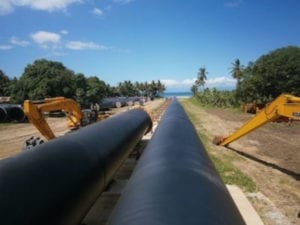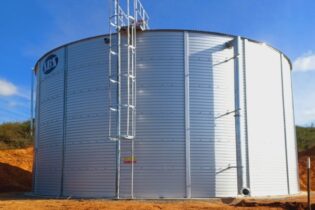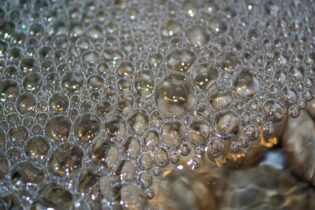The importance of water and protecting our valuable water resources will once again be highlighted this year as we celebrate World Water Week, which will take place this year from 20-26 March 2023.
World Water Day, which was established in 1993 to raise awareness about the global water crisis and the fact that 2.2 billion people lack access to safe drinking water and sanitation, will be celebrated on Wednesday, 22 March 2023. Plastics SA, the umbrella body representing the local plastics industry and the Southern African Plastic Pipe Manufacturers Association (SAPPMA), the voluntary industry association for the local plastic pipe manufacturers, are using these two occasions to emphasize the important role plastics play in ensuring South Africans have access to reliable, clean and safe drinking water and sanitation. “In 2015, the world made a global commitment to achieve the Sustainable Development Goals (SDG) 6, which aim to ensure that everyone contributes to water and sanitation management by 2030. Today, eight years later, the sad reality is that the crisis has not yet subsided. This is especially true in South Africa, where far too many people continue to be denied a basic human right – the right to safe drinking water and adequate sanitation,” Jan Venter, CEO of SAPPMA, explains. According to the most recent data, the world is still frighteningly off track and nowhere near meeting its goals on a global scale and governments would need to work four times faster to meet SDG 6. As a result, all efforts for this year’s World Water Week are aimed specifically at accelerating the change required to solve the world’s water and sanitation crisis. “This is not something that can be accomplished by a single person or organization, but rather requires a collaborative effort from everyone,” Venter says. The risk of water shedding in South Africa Over the past decade, SAPPMA has repeatedly raised the alarm about the fact that South Africa’s water infrastructure is aging and that concrete or steel water pipes installed in the 1960s are now long overdue for replacement. Says Venter: “We have been pleading with the government to invest in much-needed pipeline upgrades and repairs across the country. We have continually emphasized the importance of replacing aging and failing pipes with HDPE and PVC pipes bearing the SAPPMA mark as a quality assurance that these pipes have been independently audited and confirmed to have been manufactured in accordance with international standards. Only pipes bearing the SAPPMA logo are guaranteed to last 50 to 100 years”. Despite numerous disruptions in water supply and the increasing risk of water shedding, the country’s leaders and citizens maintained an air of complacency for the longest time. On a more positive note, SAPPMA says it appears that the Government has finally recognized the dire state of the country’s water infrastructure, following the announcement made in February by Finance Minister Enoch Godongwana during his budget speech that the National Budget Facility for Infrastructure had approved municipal water infrastructure projects worth R3.7 billion. The government has promised to spend more than R121 billion on water infrastructure in the medium term.“We can only hope that the money is finally being used for its intended purpose and that it is making its way to our plastic pipe manufacturers,” Venter says. He emphasized that this has become an urgent matter following a cholera outbreak in Gauteng in early March as a result of inadequate sanitation and insufficient access to safe drinking water.
The important work of the plastics industry in cleaning SA’s water sources Anton Hanekom, Executive Director of Plastics SA, confirms that plastics play a major role in providing people with safe and clean drinking water. “Apart from being extensively used in pipelines and underground water infrastructure, plastics are also used in plumbing accessories, water storage units and even buckets or wheelbarrows used in remote areas to transport clean drinking water back to homes”. He also emphasizes the important work done by the plastics industry in ensuring that South Africa’s water sources are clean, uncontaminated, and free of litter. “To put it simply, polluted water is contaminated water. Research has revealed that land-based waste accounts for more than 80 % of the litter found on South African beaches, in our oceans, and in other bodies of water. For this reason, we have been making concerted efforts over the past few decades to devise solutions that will mitigate this problem”. Plastics SA has launched and is supporting a number of projects across the country in which they work closely with local governments, non-governmental organizations (NGOs), community organizations, and businesses to keep South Africa’s river catchment areas and water sources clean of visible pollutants. These include ongoing beach and river clean-ups, supporting the development of collection and sorting infrastructure assisting with litterboom projects, and launching numerous education and awareness campaigns for local communities across the country in order to address waste in the environment in a proactive manner. “We are grateful for the active participation of local community groups, civil society and municipalities as well as the support of major industry role-players and the various plastic industry Producer Responsibility Organisations (PROs) to help us achieve the amazing results addressing plastics pollution in our river catchments. Many of these industry leaders are also signatories of Operation Clean Sweep (OCS), a global voluntary commitment programme aimed at preventing the loss of plastic resin in the marine environment, such as pellets, flakes, and powders. This is yet another example of the plastics industry going above and beyond to help the global fight against the world’s water crisis,” Hanekom says. No room for taking short-cuts This Water Week and World Water Day, let us remember the often unseen work that the plastics industry does around the world to provide safe and clean drinking water and reliable sewage removal to communities, while also working tirelessly to remove visible litter from our environment. Conclude the industry leaders: “Financial difficulties are rampant in all industries, and the plastics industry is no exception. Plastic product manufacturers may be tempted to cut corners when it comes to the safe and responsible disposal of their plastic waste, and we are increasingly seeing non-SAPPMA members produce inferior quality pipes in order to save money or increase profit margins. The single most important factor in our ability to consistently deliver exceptional results is trust. As an industry, we therefore remain unwavering in our commitment to do the right thing – even if nobody is looking – and we will not tolerate any activities that would bring our products into disrepute or jeopardize the health and safety of our environment, factory workers, or end-users”.






